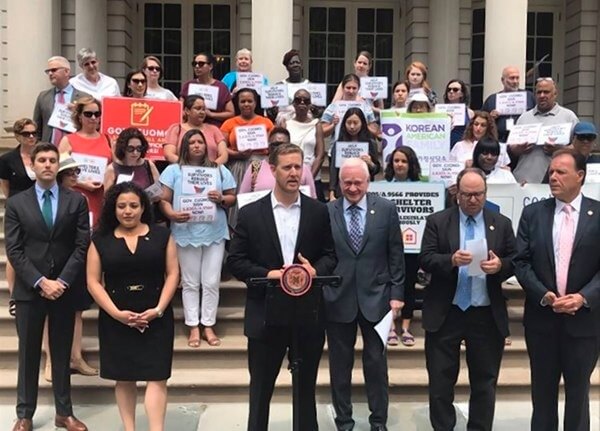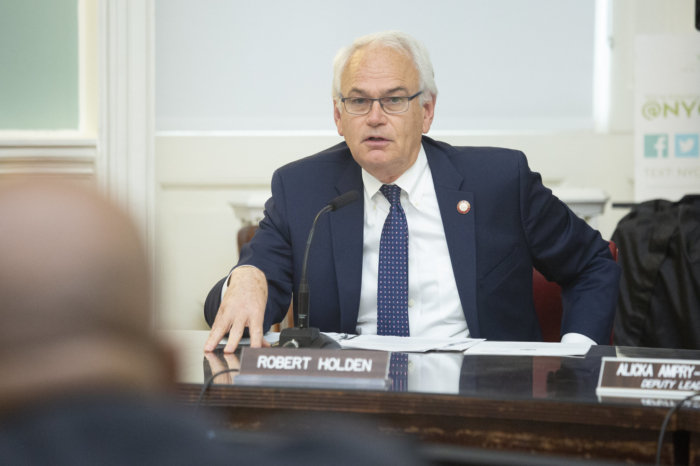By Carlotta Mohamed
Brave survivors of human trafficking shared their personal stories on the steps of City Hall last week after state Assemblyman Andrew Hevesi (D-Forest Hills) and state Sen. Martin Golden (R-Bay Ridge) alongside advocacy groups urged Gov. Andrew Cuomo to sign a bill into law to establish safe housing for victims of human trafficking.
The joint bill, S.8305/A.9566 — which passed unanimously with bipartisan support in both houses — was introduced six months ago to create “culturally competent” short- and long-term safe house residential facilities and services operated by not-for-profit agencies for survivors of human trafficking.
“People who are trafficked need to be in an environment they’re comfortable in,” said Hevesi, chairman of the Assembly’s Standing Committee on Social Services. “Since the state doesn’t provide shelters for trafficking victims, they either go to a homeless shelter, where none of their needs are serviced, or try to fit into a domestic violence shelter, where they don’t fit the requirements.”
Golden said the bill will provide victims of human trafficking a “safe and supportive place to stay providing life-changing services.”
The facilities would offer specific services such as case management, health care, mental health counseling, drug addiction and screening treatment, language interpretation and translation services, English language instruction, job training and placement assistance, post-employment services for job retention, and services to assist the victim and their family members establish permanent residency.
Jasmine Ortiz, a survivor of human trafficking and executive director of SAFE Network Inc., has endured emotional and physical health concerns, unable at times to understand certain her harmful thoughts and behaviors.
“A lot of us that have been trafficked still feel the aftermath after 20 years,” said Ortiz. “It doesn’t matter. We do live in a great nation and this shouldn’t happen in America. “We don’t need anymore empathy. We need more beds and funding. A place that survivors of human trafficking can call home, feel safe, and start the process of getting back their lives.”
Trafficking victims who don’t have a place to stay are forced to go back to their abuser, Hevesi said.
According to Hevesi, Hispanic communities in New York City are hit hard by sex trafficking, at the local and international level with traffickers bringing in people from other countries. The Asian communities and LGBT communities are frequent targets, while runaway and homeless youth are victims of trafficking as well.
According to the New York Women’s Foundation, Queens is the epicenter for trafficking on the East Coast due to its large population of vulnerable immigrants who do not have family, face language barriers, and struggle trying to find a job. All of these factors easily lead many victims into the hands of exploiters.
In 2013, New York state created Human Trafficking Intervention Courts statewide. The specialized courts, based on a pilot project started in Queens, help connect human trafficking victims to social services, including mental health care, housing, and educational and employment opportunities, instead of incarceration, according to the Center for Court Innovation.
“The push for shelter ultimately ends violence against women and girls, it prevents victimization and retraumatization and instills hope within our city and advocates,” said Afua Addo, coordinator of the Gender and Justice Initiatives at the Center for Court Innovation, which helps the justice system aid victims, reduce crime and improve public trust in justice.
According to the National Human Trafficking Hotline, which works closely with service providers, law enforcement, and other professionals in New York to serve victims and survivors of trafficking, there have been 333 human trafficking cases reported and 870 calls to the hotline this year — 238 from victims and survivors of human trafficking in New York City.
“Survivors of human trafficking are alone, have no money, and are in desperate need of help,” said Golden. “We deal with it on a regular basis in our communities. We see it going on. We see the Police Department making the raids. We see the people being taken in. They need help and its going on continually here in the city of New York.”
Reach reporter Carlotta Mohamed by e-mail at cmoha


































